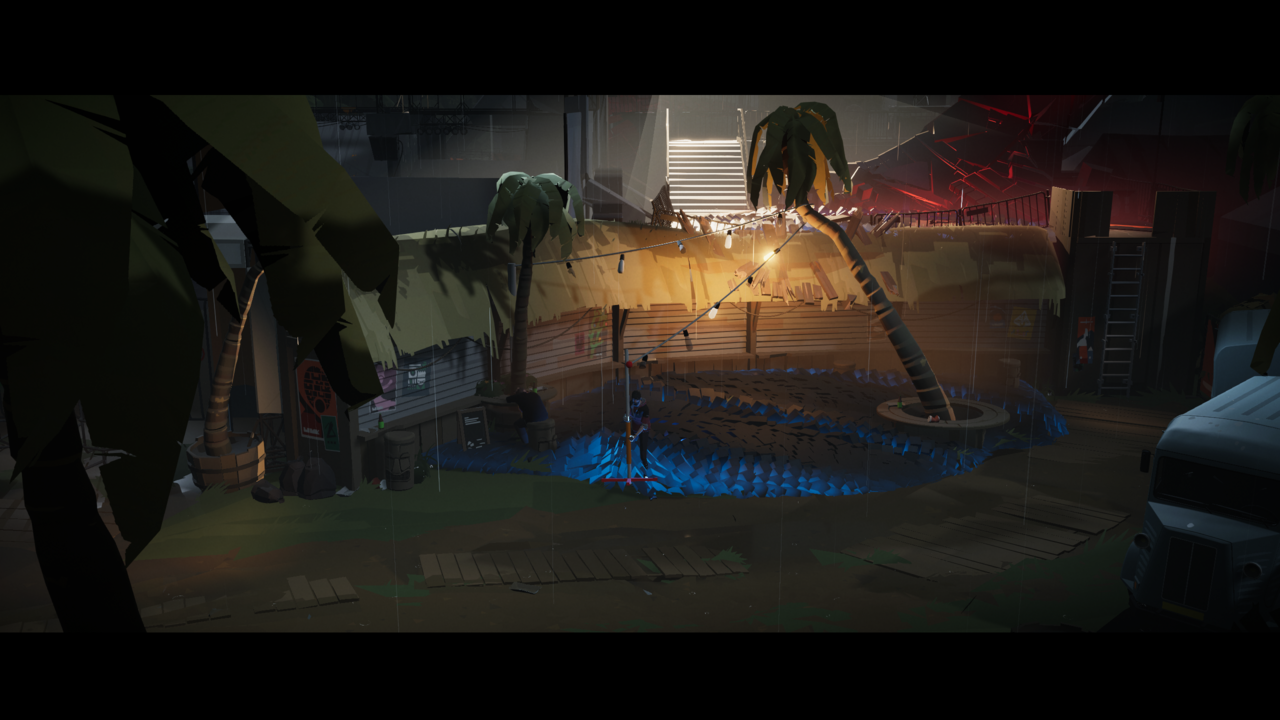Despite aliens existing as one of the most prevalent enemies in video games, seldom do we get to experience them from the vantage point of ants beneath their shoes we may well be. So often, we're tasked with shooting aliens in space battles or gunning them down on the back of military vehicles, and the lack of a proper alien invasion story in the vein of Signs or Invasion of the Body Snatchers has been a personal annoyance for years. For the most part, Somerville finally gives us such a game, but that uncommon setup I've so looked forward to is ultimately hampered by both story and gameplay decisions that keep it from feeling impactful.
Created in part by a former Playdead (Inside, Limbo) developer at a new studio called Jumpship, Somerville feels similar to those milestone puzzle-adventures. The color palette favors darkness, the story unfolds without dialogue of any sort, and you'll explore by moving through a world full of threats, solving puzzles to overcome each obstacle and outrun unassailable enemies.
In Somerville, you play the patriarch of a family of four which also includes your wife, baby, and dog. It doesn't take long at all for the story to pick up; within minutes, you go from passing out on the couch on a typical evening at home to scrambling for shelter as otherworldly pillars rain down from the sky. Separated from your wife and child, the nameless father and his four-legged friend embark on a quest to reunite with the others.

Early on, Somerville feels exactly like what I was hoping for. A filmic opening credits sequence trails the family's car from high above to the tune of emotive music like the first few minutes of The Shining. Going 0 to 60 in a heartbeat feels like the right way to introduce the game's alien threat, too. The characters have no comprehension of what's going on, so neither do you. And the driving force behind the story--reunion and safety--are easy to latch onto. It starts strong.
But one of Somerville's early differences from games like it quickly begins to leave it trailing behind predecessors. The game looks like a 2D (or 2.5) adventure, but there's often a lot more space to explore on the Z axis than you might expect, allowing you to move toward or away from the screen. This, in tandem with sometimes unclear pathway design, creates routine issues with depth perception, causing you to bump up against stuff often.
In quieter moments, this just means fumbling around a bit inelegantly, but during chase sequences, it often means game over, as such scenes are often designed with the idea that you perfectly squeeze through, over, under, or around each obstacle.
A low number of puzzles feels detrimental at times. At four hours long, I was surprised to find the last hour or so is largely void of puzzles. Much of the game is built around a special ability with which the protagonist is imbued--a way of manipulating the alien matter that corrupts the world, allowing him to either liquify or solidify the earth around him. The possibilities for such a mechanic feel obvious as soon as you're given this magic touch, but the game oddly ignores using it in any clever ways for large portions of the game. When it is used, no one puzzle or section of puzzles does much to elevate the mechanic's earliest usages.
It's oddly structured in other ways too, though more successfully. The extraterrestrials are varied in shape, size, and function, and as a result they feel collectively unfathomable to human eyes. The game does well to make them feel intimidating by way of their unknowable intentions. While single beings may clearly telegraph they mean you harm, understanding their greater purpose feels like trying to teach a spider to read. It's in this way that Somerville best delivers as an alien game unlike virtually any other in video games--where it aligns with Chiang's Story of Your Life more than Insomniac's Resistance.

The game also uses the god-like presence of these beings to mess with spacetime and perception in clever ways I ought not spoil here. Suffice it to say, sometimes what you think you're seeing is not the truth of the matter, and lifting the veil to rediscover reality is a choice that is yours to make more than once in the game.
These story beats, uniquely structured and difficult to talk around, are Somerville's greatest attributes. On the contrary, I was surprised to find the more intimate family drama doesn't land as well. Being torn apart from his loved ones early on, the ensuing journey should have been a gutpunch, but reunion winds up taking a backseat to a bigger picture that feels harder to relate to, telling a more familiar story of fomented resistance. At least to that end, the game offers a few sneaky alternate endings--I found three and I suspect there may be more.
Tucking away secrets that change your fate provides a satisfying, if unwieldy, layer of player agency in a story where the threat is virtually indecipherable as a species. You can't understand their intentions, and thus, you almost stumble into better or worse endings for yourself. Thankfully, the game allows you to easily see alternate versions of events, which collectively help paint a more vibrant picture of what Somerville is trying to say, even as that message feels only partially delivered by the game's true endpoint.
Short games aren't inherently flawed, but Somerville needed a bit more time to convey its major themes. The scope of the alien invasion story looks at both macro and micro relationships among people in ways that only end up scratching the surface of saying something interesting, and though it builds up an interesting universe that leaves me with questions regarding its alien overlords, I was surprised to find in myself an indifference toward finding the truth that's out there.




